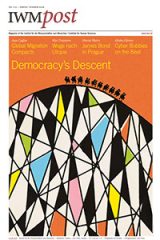

In collaboration with
Institute for Human Sciences
The Institute for Human Sciences / Institut für die Wissenschaften vom Menschen (IWM) is an independent institute for advanced study in the humanities and social sciences. Since its foundation in 1982, it has hosted more than 1500 scholars, journalists and translators from all over the world. Many of the Institute’s Permanent and Visiting Fellows are regular contributors to Eurozine or its focal points The World in Pieces and Ukraine in European Dialogue (see below).
Website: www.iwm.at
Twitter: @IWM_Vienna
Youtube: IWMVienna

Articles
The rapid and drastic process of secularization in western Europe over the last decades has not diminished the continuing unease with which Europe considers the Islamic religion and Muslims in its midst. In this benchmark essay from 2004, José Casanova argues that the “Islam problem” is an indicator of the disparity between liberal and illiberal strands of European secularism.
Triumph of evil
Portrait of a war criminal
Radislav Krstic, General of the Republika Srpska army and Deputy Commander of Drina Corps, was the first war criminal sentenced for genocide by the ICTY. He was sentenced to 46 years of prison for ordering the deaths of over seven thousand Muslim men were executed, in the UN safe area of Srebrenica, between 13 and 19 July 1995, while 30,000 people were forcibly deported. Slavenka Drakulic witnessed the trial and traces Krstic’s biography.
An invisible wall
The hidden factor of Belarusian reality
Contrary to other former socialist Central and Eastern European countries, Belarus has hardly undergone any cultural and economic changes and remains cut off from the international arena. At the core of this problem, argues Nelly Bekus-Goncharova, is the Belarusian media landscape which proves incapable of creating an integrated informational space. State media and independent mass media remain locked in self-absorbed and separate discourses, neither of which provide a projection of what is really happening in Belarus. Can this deadlock be overcome?
Krysztof Pomian examines European attitudes towards Poland and Poland’s attitudes towards the European Union. He uncovers startling similarities in the rhetoric used by the European Left and the Polish Right in their arguments against the enlargement.
Focal points

Inspired by a lecture that Clifford Geertz delivered in 1995 at the Institute for Human Sciences in Vienna, this focal point engages with ‘deep diversity’, ‘a sense of dispersion, of particularity, of complexity and of uncenteredness’ rather than unified world order. It follows the launch of a research programme of the same name at the institute in January 2023.

Post-revolutionary Ukrainian society displays a unique mix of hope, enthusiasm, social creativity, collective trauma of war, radicalism and disillusionment. With the Maidan becoming history, the focal point ‘Ukraine in European Dialogue’ explores the new challenges facing the young democracy, its place in Europe, and the lessons it might offer for the future of the European project.
Projects and publications

